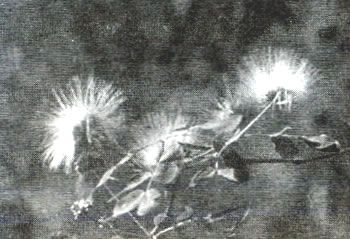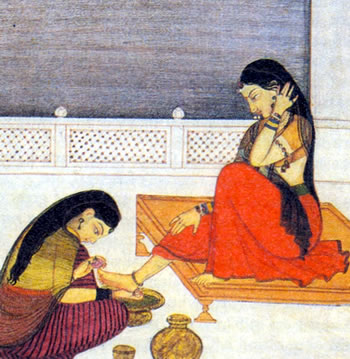Parvati's Tapasya - Glossary
1. Cupid: god of Love (or Desire) for the Romans. In Sanskrit this god has many names: Kama (desire), Manobhava (born of the mind), Smara (remembrance), Manmatha (the one who churns the mind), Madana (the one who intoxicates).
2. The daughter of the Mountain: Parvati means the daughter of Parvat, i.e. the mountain, Himalaya. Shailaja, another name for Parvati, means also the daughter of the rocs or of the mountain.
3. Shirisha: One of the most beautiful Indian flowering trees (latin name: Albizzia lebbek). The delicate flowers (also called Sitapushpa) look like miniature powder-puffs. The leaves are sensitive and fold up on being touched.

Shirisha flower
4. Tawny: pale golden brown
5. Vermilion: bright red (here it means a powder of this colour)
6. Kusha grass: sacred grass used in ceremonies. Extremely sharp.
7. Rosary: a string of beads used for counting prayers or mantras. Rudraksha beads (brown seeds with furrowed surfaces that are the pits of a fruit) are worn by Shaivaite devotees.
8. Saplings: young trees
9. Kartikeya: the son whom Parvati will get from her union with Shiva (the Kumara of the title). In this particular Sanskrit verse, the name Guha is used. Guha can mean "leader of armies" or "born in a cave".
10. Chakravaka; sheldrake or ruddy goose or brahminy duck. These birds are proverbial for the supposed necessary separation at night. They are believed to have been cursed by a sage to spend nights apart.
11. Anchorites: ascetics.
12. Ablutions: ritual bath.
13. The Seven Rishis (saptarshi): seven great Rishis of the vedic times: Gotama, Bhardwaja, Vishwamitra, Jamadagni, Vasishtha, Kashapa and Atri. They are sometimes represented by the seven stars of Ursa Major. They are described as bathing in the heavenly Ganges, sitting in its waters, practising Pranayama and other yogic disciplines.
14. Pinaka bow: name of Shiva's bow, made of a rainbow with five heads of Nagas. Pinakin is also a name for Shiva.
15. Kinnara or Kimnara: mythical beings traditionally considered to have the form of a man and the head of a horse. According to some scholars, they are singers and musicians dwelling in the paradise of Kubera on Kailash.
16. Elephant-hide: when Shiva killed Ganasura, the elephant demon, he skinned him and danced in the bloody skin.
17. Alaktaka: in Sanskrit alaktaka or laakshaa: a resinous substance coming out of the sap of some trees, due to an insect called the lac insect. This red substance is used as a dye. Synonym: shellac.

The dyeing of the feet (Kangra, cir 1785)
Related Books
- Alexander the Great
- Arguments for The Existence of God
- But it is done
- Catherine The Great
- Danton
- Episodes from Raghuvamsham of Kalidasa
- Gods and The World
- Homer and The Iliad - Sri Aurobindo and Ilion
- Indian Institute of Teacher Education
- Joan of Arc
- Lenin
- Leonardo Da Vinci
- Lincoln Idealist and Pragmatist
- Marie Sklodowska Curie
- Mystery and Excellence on The Human Body
- Nachiketas
- Nala and Damayanti
- Napoleon
- Parvati's Tapasya
- Science and Spirituality
- Socrates
- Sri Krishna in Brindavan
- Sri Rama
- Svapnavasavadattam
- Taittiriya Upanishad
- The Aim of Life
- The Crucifixion
- The Good Teacher and The Good Pupil
- The Power of Love
- The Siege of Troy
- Uniting Men - Jean Monnet